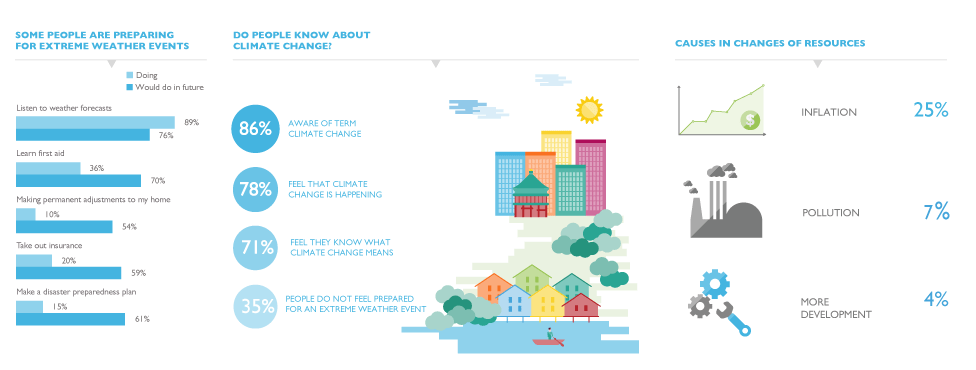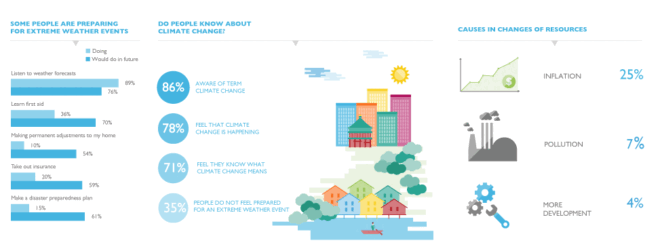Perceptions of Climate Change in China

The Climate Asia project
Climate Asia is the largest ever study of people’s experience of climate change in seven countries – Bangladesh, China, India, Indonesia, Nepal, Pakistan and Vietnam – involving the collection and analysis of survey data from over 33,500 people. This unique data provides information for governments, donors, the media, NGOs and everyone who wants to support people to adapt to the changing environment.
Country Infographic

Context
A higher proportion of people in China feel life has improved in the last five years than in any other of the Climate Asia countries. People are enjoying increases in income and access to food, water and energy. But alongside this dramatic recent development, people have become very concerned about pollution’s effect on their health.
Across the regions surveyed, Beijing, Sichuan and Guangdong, people have seen increases in temperature, rainfall and extreme weather events. But far fewer people are experiencing high levels of impact as a result of these changes in climate than in other countries. In addition, fewer people expect to experience high levels in future.
Knowledge and understanding of climate change is high in comparison to other countries in the region. Many Chinese people are taking small actions to alter their personal contribution to climate change – for instance through efficient use of energy and using renewable energy.
Communication
The government included many environmental measures in its latest five-year plan, making climate change a core part of government policy. People are able to cite a wide variety of types of communication on issues related to climate, from TV adverts to posters, neighbourhood meetings and public events.
However, people do not feel well informed about how to respond to changes, for example very few people feel prepared for extreme weather events. Knowledge of how to make changes to lifestyle and livelihood is low.
People are also less likely than those in other Climate Asia countries to discuss issues related to climate, environment, food, water and energy and feel less involved in their communities. They identify a lack of information and understanding as key barriers preventing them from taking action.
Despite the variety and reach of current communication, people still think the media should do better. There are opportunities to use television and online media to increase understanding of how to take action to respond to changes as well as to encourage environmentally friendly behaviours.
Communication could support, for instance, farmers in Sichuan to respond to changes that are having an impact on their livelihoods. Another group who would benefit is young people in urban areas who show a willingness to adopt more environmentally friendly practices.
Findings
Television is the most trusted media.
A desire to be healthy (93%) and to create a better future for their children (91%) were key motivators for action.
72% of people felt they needed government support to act.
The most important value is “earning as much money as possible” (35%).
31% of people knew of existing communication on climate change issues.
93% of people get information on these issues from television.
50% of the people surveyed had used the internet in the last day.
81% of people think life has improved in the past five year.
(0) Comments
There is no content